|
|
|
Sort Order |
|
|
|
Items / Page
|
|
|
|
|
|
|
| Srl | Item |
| 1 |
ID:
122306
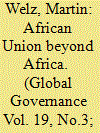

|
|
|
|
|
| Publication |
2013.
|
| Summary/Abstract |
This article explores the motives and means of the African Union and its member states for engaging in governance beyond Africa, and shows the leeway and limits the African organization faces in this regard. Two questions are at the center of the article. Is the AU successful in influencing governance beyond Africa? And what explains its success or failure? Three case studies form the article's empirical background: a study of the 2005 discussion about a reform of the UN Security Council; a study of the negotiations during the Climate Change Conference in Copenhagen in 2009; and, finally, a study of the attempt to defer the International Criminal Court's arrest warrant against Sudanese president Omar al-Bashir in 2009. The article argues that the AU can influence governance beyond Africa only if it is united, adopts realistic positions, and gains the support of more influential global players.
|
|
|
|
|
|
|
|
|
|
|
|
|
|
|
|
| 2 |
ID:
134351
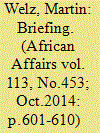

|
|
|
|
|
| Summary/Abstract |
ACADEMIC ANALYSES OF THE PROLONGED CRISIS in the Central African Republic (CAR) and the international response to it are rare. This masks the depth of the crisis. The most recent outbreak of conflict alone, following a coup d'état staged by the Séléka rebels in March 2013, left countless civilians dead,1 more than half a million people displaced, and over half of the 4.6 million population in immediate need of aid.2 Several regional and international organizations, including the African Union (AU), the Economic Community of Central African States (ECCAS), the European Union (EU), and the United Nations (UN), became involved in the process of crisis solution, with all of the organizations deploying troops to the CAR. Their efforts have thus far born limited results; fighting and human suffering continue.
|
|
|
|
|
|
|
|
|
|
|
|
|
|
|
|
| 3 |
ID:
186079
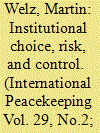

|
|
|
|
|
| Summary/Abstract |
Using institutional choice theory, this article seeks to explain why the G5 Sahel, an international organization that comprises Burkina Faso, Chad, Mali, Mauritania, and Niger, was created in 2014 and tasked to deal with conflict management in the Sahel through its Joint Force that was established in 2017. While the use of the theory offers crucial insights into the creation of the G5 Sahel, I also find that the theory overestimates the costs and risks attached to the creation of a new institution while underestimating the desire of states to maintain control over actions on the ground – at least when it comes to security questions.
|
|
|
|
|
|
|
|
|
|
|
|
|
|
|
|
| 4 |
ID:
145596
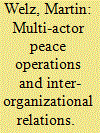

|
|
|
|
|
| Summary/Abstract |
Multi-actor peace operations have become the dominant mode of peace operations since the end of the cold war. This article uses the literature on institutional linkages and inter-organizational relations, thus far developed independently from the literature on such operations, to shed light on the relations between the organizations involved in them. The analysis of one specific case – the interactions between the United Nations, the African Union, the Economic Community of Central African States and the European Union in the Central African Republic – shows the usefulness of merging this body of theory with the primarily empirically driven research on peace operations and UN–regional collaboration. The findings of this study are meant to facilitate further research on multi-actor peace operations and serve as a building block for a theory explaining the emergence and configuration of such operations.
|
|
|
|
|
|
|
|
|
|
|
|
|
|
|
|
| 5 |
ID:
189272
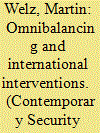

|
|
|
|
|
| Summary/Abstract |
This article studies why authoritarian states participate in international interventions. Troop contributions of such states indicate the support of authoritarian leaders for a liberal-cosmopolitan order that entails the protection of human rights internationally, while they deny such rights to their own citizens. I focus on the decisions of Chad’s long-term president Idriss Déby Itno to take an active stance in various international interventions. The analysis builds on the theory of omnibalancing, which holds that authoritarian leaders balance external and internal threats to ensure their survival. I demonstrate how Déby used troop deployment as part of his omnibalancing strategy. It allowed him to stay in power until his death in 2021 and made Chad’s democratization unlikely. For Déby’s omnibalancing not only quelled the domestic opposition and silenced international critique against the authoritarian rule, but also contributed to the securitization of the state.
|
|
|
|
|
|
|
|
|
|
|
|
|
|
|
|
| 6 |
ID:
174075
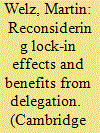

|
|
|
|
|
| Summary/Abstract |
This paper explores the relations of the African Union (AU) with its member states through the lens of principal–agent theory. I consider the AU Commission—an international public administration—as an agent to which its member states—the principals—delegate authority. I show that core assumptions of principal–agent theory apply to the AU’s relations with its member states. These include that principals aim to keep control over their agent, that we find agents acting opportunistically, that principals sanction the agent if needed and that the heterogeneity of preferences amongst principals decreases the level of authority delegated to the agent. However, my analysis also suggests that principal–agent theory needs to broaden its understandings of lock-in effects and of the reasons why states limit their delegation of authority.
|
|
|
|
|
|
|
|
|
|
|
|
|
|
|
|
| 7 |
ID:
133288
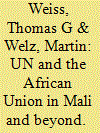

|
|
|
|
|
| Publication |
2014.
|
| Summary/Abstract |
The United Nations (UN) and the African Union (AU) have collaborated in building a viable African Peace and Security Architecture and have worked together in a number of armed conflicts over the past decade. Examples include the peace operations in Burundi and Somalia, and the hybrid peace operation in Sudan's Darfur region which is perhaps the most prominent illustration of this collaboration. Although the UN Security Council authorized the intervention in Libya, which was approved by leading regional organizations (the Arab League, the Organization of the Islamic Conference and the Gulf Cooperation Council), it was opposed initially by the AU although the three African states in the Security Council voted for it. Relations cooled as a result and have grown colder still as the UN snubbed the AU and its initial efforts to engage in post-conflict stabilization in Mali. While the AU sought to prove itself as a capable security provider and partner on the continent with its operation AFISMA, France's Opération Serval and the UN's peace operation for Mali, MINUSMA, bypassed the African Union. This article explores the underlying fault-lines between the two organizations by examining interactions between the UN and AU since the latter's launch in 2002, but focusing on the Mali case. The fault-lines emerging from the analysis are different capabilities, risk-averse vs risk-assuming approaches to casualties, diverging geopolitics and leadership rivalry.
|
|
|
|
|
|
|
|
|
|
|
|
|
|
|
|
| 8 |
ID:
101587
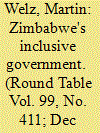

|
|
|
|
|
| Publication |
2010.
|
| Summary/Abstract |
Zimbabwe seemed to be in a political transition-but only on the surface. In actual fact, the new government established under the power-sharing agreement between President Mugabe and newly elected Prime Minister Morgan Tsvangirai proved unsuccessful in its first 100 days owing to continued rivalry and a lack of commitment on behalf of Mugabe and his party. Mugabe managed to secure key positions in the new government for his cronies. They continued to control the relevant security organs as well as the Reserve Bank, which held a key position because its Governor guarded the budget available for the new ministers. Consequently, sabotage was an imminent threat for the new government. Mugabe benefited from the weakness of the opposition, which was split and had an indecisive and uncharismatic leader who failed to secure financial support from the West. To complicate the situation even further there were more players involved in the political arena of Zimbabwe, including the two major farmers' groupings, an emerging third party under Simba Makoni, the trade unions and white businessmen. They all had their own agenda. Mugabe and his ruling clique relied on each other as they had both committed gross human rights violations over the last 25 years. They either fall together or their mutual dependency keeps them going. Change was unlikely to occur; even the new Movement for Democratic Change ministers were aware of this.
|
|
|
|
|
|
|
|
|
|
|
|
|
|
|
|
|
|
|
|
|